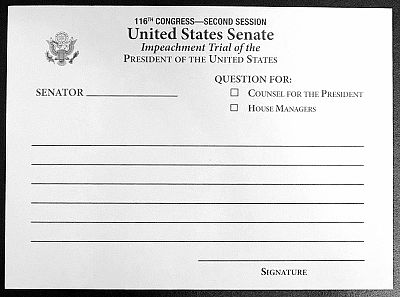Senators will have 16 hours to grill lawyers from the White House and the House managers before deciding whether to hear from witnesses.
WASHINGTON — It's question time for the Senate in President Donald Trump's impeachment trial.
The move to the new phase of the trial Wednesday comes after Trump's legal team finished up its opening arguments Tuesday and ahead of a decision on whether to hear from witnesses. It also gives Republican senators who've complained about the lead House manager, Rep. Adam Schiff, D-Calif., a chance to force him to answer their questions.
Here's what we know about how the question-and-answersession will work:
Senators have to submit their questions in writing to Majority Leader Mitch McConnell, R-Ky., or Minority Leader Chuck Schumer, D-N.Y. The leaders will submit the questions to Chief Justice John Roberts, who will announce the name of the questioner and read each question out loud.
Roberts will alternate questions from Republicans and Democrats.
Both sides will have a total of 16 hours to answer questions over two days, beginning Wednesday at 1 p.m ET.
Other than that, both sides seem to have a bit of leeway in how to proceed. McConnell said senators should keep their questions as brief as possible, but he didn't set a specific time limit. The official question cards that were sent to senators early Tuesday evening, however, have just six lines.
There was also no announced limit on the number of questions a senator can ask. The office of Sen. Josh Hawley, R-Mo., released a list of nine questions he has about Schiff's handling of the case.
Roberts said he wanted — but didn't outright order — both sides to keep their answers under five minutes, as House managers and the president's lawyers were told to do in President Bill Clinton's 1999 impeachment trial.
Full coverage of President Donald Trump's impeachment trial
A source close to the defense team told NBC News that the lawyers are preparing for a "variety of questions" from the Democratic side that they think will be "largely predictable" but that they're also trying to prepare for potential curveballs.
The source said Republican questions will likely aim to provide greater clarity on "areas of interest" that senators have talked about privately.
In Clinton's impeachment trial, senators asked 106 questions over three days.
Download the NBC News app for full coverage of the Senate impeachment trial
After the question-and-answer session is over, both sides will have a total of four hours to make arguments, according to theorganizing resolution for the trial. That will be followed by deliberation and then a vote on whether to subpoena witnesses or documents.
If the Senate votes against issuing subpoenas, it could then immediately move on to voting on the two articles of impeachment. Anything less than 67 votes to convict would result in acquittal for the president.
Frank Thorp V reported from Washington. Dareh Gregorian reported from New York.












